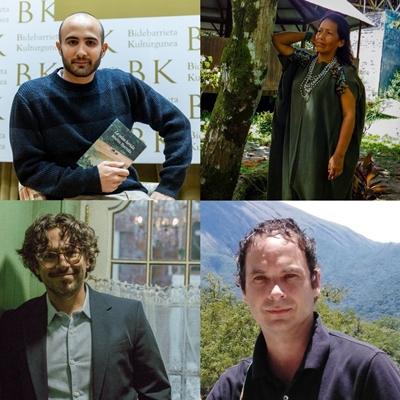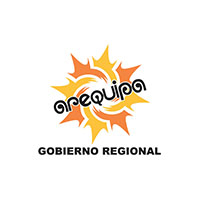Hay Festival Arequipa 2021 – Nature & Environment
More info at +51 984346405 or infoperu@hayfestival.com
Event HJ4
Martín Ibarrola in conversation with Daniel Mitma
Exploring a threatened territory
Universidad Continental, Auditorio
Read moreMartín Ibarrola (Spain) will talk about his travel book, La selva herida, which was written after a journey on which he accompanied the Basque explorer Miguel Gutiérrez on an expedition through Peru, Bolivia and Brazil. During the journey, Ibarrola documented the many people who make up daily life in the Amazon region, from a biochemist who measures the pollution levels of rivers, to indigenous communities who fight against the lobbies, and even a group of miners whose dream is to form a band one day. The author will share with the audience these stories and will talk about the dangers facing the Madre de Dios rainforest. In conversation with Daniel Mitma.
With the support of Acción Cultural Española (AC/E)

Event HJ15
Brigitte Baptiste in conversation with Paola Donaire
On our biological heritage
Teatro Arequepay
Read moreBrigitte Baptiste is one of Colombia’s most eminent scientists, an expert in matters related to the environment and biodiversity. She is a Biology graduate from the Pontificia Universidad Javeriana, has a Master’s degree in Tropical Development and Conservation, and a doctorate in Environmental Management from the Instituto Universitario de la Paz. She was General Manager of the Alexander von Humboldt Biological Resource Research Institute and is now the Rector of EAN University. She will talk at the Hay Joven about the biological riches of our countries, the importance of protecting them, and what actions to take in order to do this. In conversation with Paola Donaire.

Event HJ17
Josefa Sánchez and Alberto Matarán in conversation with José Luis Ramos Salinas
Our land, our life
Teatro Arequepay
Read moreThe sociologist and researcher Josefa Sánchez Contreras belongs to the Zoque people of Chimalapas in Mexico. As a researcher, she writes about territorial defence, indigenous rights, the history of rebellions and colonialisms, and is the co-author of the book Colonialismo energético. As an activist she is a part of the Matza Collective, a group of young Zoques, which works to defend the rivers of the Chimalapas forests from extractive opencast mining megaprojects.
In conversation with Alberto Matarán and José Luis Ramos Salinas.

Event 36
Brigitte Baptiste in conversation with Roberto Zariquiey
Auditorio Colegio de Abogados
Read moreWith the support of the Eccles Centre for American Studies - The British Library

Event 46
Martín Ibarrola, Vabi Miguel Toribio and Roberto Zariquiey in conversation with Pedro Favaron
The teachings of the rainforest
Casa Tristán del Pozo - Fundación BBVA
Read moreWe talk about the Amazon, one of the richest and most biodiverse regions on the planet, with hundreds of cultures and languages, yet it is a territory threatened by negligent human actions. With the participation of Martín Ibarrola (Spain), author of the travel book La selva herida, which is the story of an expedition through Peru, Bolivia and Brazil; Vabi Miguel Toribio, Yanesha leader, translator and interpreter recognised by the Peruvian Ministry of Culture, she is also a social and environmental activist; and Roberto Zariquiey, a Doctor of Linguistics from La Trobe University (Melbourne), lecturer at the Pontificia Universidad Católica del Perú (PUCP) and head of many research and social projects linked to Amazon languages. They will talk to Pedro Favaron, who has recently published Non Onan Shinan: Los mundos medicinales y la sabiduría de una familia Shipibo-Konibo.
With the support of Acción Cultural Española (AC/E)

Event 49
Vabi Miguel Toribio and Josefa Sánchez in conversation with José Luis Ramos
Energy sovereignty
Auditorio Colegio de Abogados
Read more
Partner for Latin America

Principal Sponsors




Government Partner

Institutional Partner

